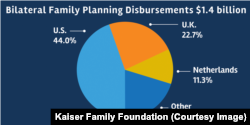Donor governments have increased their financial support for family planning efforts in low- and middle-income countries, where more women and girls are voluntarily using modern contraceptives, two new reports show.
International government funding for family planning in developing countries climbed to $1.4 billion last year, up $100 million or 9 percent from the previous year, the California-based Kaiser Family Foundation (KFF) found in its report released Thursday.
The United States led in donations, providing $637 million or almost half of all bilateral funding for family planning programs in 2014, the KFF report found. Other leading government donors include the United Kingdom ($328 million), the Netherlands ($164 million), Sweden ($70 million) and France ($70 million).
Their donations – along with those of Australia ($39 million), Canada ($48 million), Denmark ($29 million), Germany ($31 million) and Norway ($21 million) – account for 99 percent of global government funding for education, contraceptives delivery, counseling and other services, the report said.
Of these top 10 donors, all but Canada and the United States had committed to increasing their support at the international 2012 London Summit on Family Planning. That summit laid the groundwork for Family Planning 2020, a global partnership promoting the rights of women to determine whether and when to have children.
Contraceptive use expands
The partnership released its own report Thursday, showing just over 290 million women and girls in the world’s poorest countries voluntarily use modern contraceptives. That’s up from 266 million in 2012.
"Some of the [government] donors are close to fulfilling their commitments, or their commitment periods are coming to an end," said Adam Wexler, a director of KFF's Global Health Budget Project and a co-author of its report. "It will be interesting to see whether they’ll increase funding."
Donor governments also had increased their funding for family planning efforts in 2013, following the summit.
Family planning improves the health of women and children, as well as the educational and economic opportunities for females, research has found. Planning reduces the rates of unintended pregnancies, maternal and infant mortality, abortion and transmission of HIV/AIDS, according to the World Health Organization.
WHO estimates 225 million women in developing countries want to delay or halt childbearing but aren’t using modern contraception methods.
If their needs were met, "there would be 54 million unplanned pregnancies averted and 26 million abortions averted globally," said Rhonda Smith, a research associate at the Washington-based Population reference Bureau.
Sub-Saharan Africa "has the highest level of unmet need," Smith said, with the world's highest fertility rate, averaging five births per woman. That’s more than twice the rate in Asia and almost four times that of Europe.
Barriers to planning
Lack of medically sound information ranks among the biggest obstacles to family planning.
Mistakenly, some women "don’t even perceive themselves at risk for pregnancy, either because they’re breastfeeding or having sex infrequently," Smith said, calling for more education and counseling.
Smith said other deterrents to family planning include concerns about health risks and the side effects of contraception, "often due to persistent myths and misconceptions," as well as opposition for cultural or religious reasons.
Lack of access to modern contraception – in terms of cost or distance – shows up as a lesser concern in surveys conducted in poor countries, Smith said.











